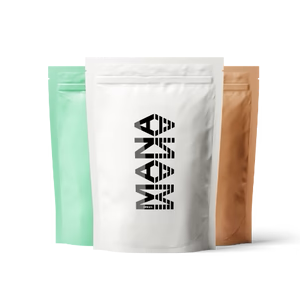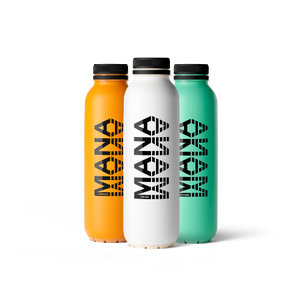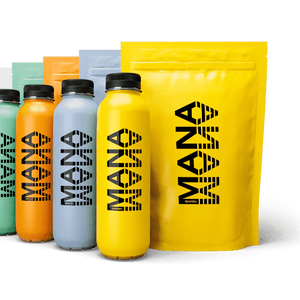
Throughout the course of our lives, we make hundreds of thousands of decisions. From decisions regarding little things like what to eat for breakfast or what clothes to wear on a given day, to decisions that can affect our future for decades to come. Some of our decisions may even affect the fates of entire future generations. One of these is how we live our lives with respect to the planet; in other words, how sustainably we choose to live. But what exactly does sustainability mean and why is it such a pressing topic? Most importantly, how can the decisions you make today contribute to a better future? Here are five simple but effective tips.
Living sustainably means understanding how our everyday decisions affect the world around us. At the same time, it also means finding ways to live fuller and more effectively. Even small changes can make big differences, especially if we all pitch in. So, why not join us in our mission for a better world?
1. Include as many plant foods as possible in your diet
If you take just one of these five tips, let it be this one.
As it stands today, ¾ of the land used for agricultural purposes is devoted to production of livestock (in the last 50 years meat production has more than tripled). Nevertheless, despite how advanced our world is, 3 billion people are still malnourished according to the World Health Organization. This is mainly a result of rapid population growth and the declining availability of land, drinking water, and energy sources.
Production of plant food requires not only far less resources, such as land and water, but it produces far fewer emissions. In March of 2020, respected portal Our World Data published a comprehensive study on the carbon footprint of food. It shows that production of 1 kilogram of beef results in up to 127.5 times more greenhouse gas emissions than production of plant foods like root vegetables.
This is just one example of why eating plant foods is much more sustainable in the long term than eating meat. Naturally, Mana is a perfect solution to this problem because it’s 100% plant-based and it contains everything your body needs to be healthy.
2. Limit your use of disposable bottles, containers, and bags
These are easy to use, but costly for the environment. Here are some facts to illustrate:
- Approximately 17 million barrels of oil are needed to make a year’s supply of PET bottles. That’s enough to power 1.3 million cars or 190,000 households for the same period!
- There are trillions of tons of plastic waste in the oceans, which form “mountains” that stand up to 1 kilometer tall! 70% of this waste has accumulated over the last 40 years.
- Plastics often contain chemicals like BPA, which disrupt the hormonal balance in our bodies and can contribute to the development of infertility, breast cancer, and asthma.

What can you do about it? Get cloth shopping bags or invest in quality, reusable food containers or water bottles. Pay attention to the material these things are made of, too. For example, when buying a water bottle, look for stainless steel or borosilicate glass, which is more resistant to heat and chemicals, or at least material marked as BPA-free.
If everyone made a change like this, the total positive impact would be huge. Last year, we took a major step towards reducing our use of plastic, which you can read more about here.
3. Start composting (this works in apartments, too!)
Organic materials like eggshells, leaves, fruit and vegetable peels, etc. account for around 28% of the waste created by each household. By composting, we can easily turn this waste into quality fertilizer and significantly reduce greenhouse gas emissions.
If biowaste is composted and deposited in soil, a large part of the carbon remains in the compost/soil instead of in the atmosphere (which is where it goes in case of combustion). Indeed, one ton of composted material can save around 0.352 tons of CO2 emissions.
So, composting is a great way to help protect our environment. And if you live in an apartment, all you need is a small composter with coarse material on the bottom (e.g. wood chips), which allows aeration and drainage of excess water, and biowaste on top (don’t forget to mix regularly).
You can also look into vermicomposters, or worm composting bins. These are another great way to produce nutrient-rich organic fertilizer, including indoors.
4. Use alternative means of transport
Did you know that a regular passenger car produces around 4.6 tons of CO2 per year? If you have to drive, try using biofuels–most have lower emissions of CO2 and other pollutants than fossil fuels*. Biofuel can be burned directly (which would of course require proper modification of your car), or you can use a special fuel mixture that has biofuel added.
Another option is to switch to an electric or hybrid car. According to the European Energy Agency, the carbon footprint of electric cars is 17-30% lower than that of petrol or diesel cars. Even a single electric car can save approximately 1.5 million grams of CO2 per year.
If you can’t make the switch, walking and cycling are always a great option. And if neither of those are possible either, public transit or carpooling is the next best thing.
*It’s important to note that not all biofuels are more environmentally friendly than fossil fuels. At present, biological waste such as grass biomass and wood is the most environmentally friendly (in comparison with petrol).
It's also important to take note of where and to what extent your biofuel crops are produced. It doesn’t make so much sense to use them if they’ve been imported from halfway across the world or grown in quantities that upset the environmental equilibrium.
5. Save water (take shorter showers and collect rainwater)
The average person consumes approximately 100 liters of water every day (showering, washing hands, drinking, watering plants, doing laundry…). Changing your daily routine is a great way to limit water use. For example, when showering, the average person consumes 19 liters per minute. So, by shortening your shower by 2 minutes, you can save nearly 40 liters of water!
Another thing you can do is collect rainwater. All you have to do is buy a bucket or other water container and place it on your balcony if you live in an apartment or at the mouth of your gutter if you live in a house. This water can then be used to water plants or, if filtered, so much more!
Sources:
[1] Kris Green. (2018) The Environmental Advantages of Reusable Water Bottles. https://biofriendlyplanet.com/green-alternatives/reusables/the-environmental-advantages-of-reusable-water-bottles/
[2] Hannah Ritchie, Max Roser. (2017) Meat and Dairy Production. https://ourworldindata.org/meat-production
[3] David Pimentel, Marcia Pimentel. (2003) Sustainability of meat-based and plant-based diets and the environment. https://academic.oup.com/ajcn/article-pdf/78/3/660S/23712272/660.pdf
[4] EPA, United States Environmental Protection Agency. (2018) Overview of Greenhouse Gases. https://www.epa.gov/ghgemissions/overview-greenhouse-gases
[5] Our World in Data. (2020) The carbon footprint of foods: are differences explained by the impacts of methane? https://ourworldindata.org/carbon-footprint-food-methane
[6] EPA, United States Environmental Protection Agency. (2018) Greenhouse Gas Emissions from a Typical Passenger Vehicle. https://nepis.epa.gov/Exe/ZyPDF.cgi?Dockey=P100U8YT.pdf
[7] Boston University. Ten Sustainable Actions. https://www.bu.edu/sustainability/what-you-can-do/ten-sustainable-actions/take-shorter-showers/
[8] Centers for Disease Control and Prevention. (2013) Rainwater Collection. https://www.cdc.gov/healthywater/drinking/private/rainwater-collection.html
[9] Jan Habart. (2003) Kompostováním proti klimatickým změnám, aneb sequestrace a obchod s emisemi skleníkových plynů. https://biom.cz/cz/odborne-clanky/kompostovanim-proti-klimatickym-zmenam-aneb-sequestrace-a-obchod-s-emisemi-sklenikovych-plynu
[10] European Environment Agency. (2018) Electric vehicles from life cycle and circular economy perspectives. https://www.eea.europa.eu/publications/electric-vehicles-from-life-cycle
[11] Jaroslav Petr. (2008) Jak ekologická jsou biopaliva?
https://biom.cz/cz/odborne-clanky/jak-ekologicka-jsou-biopaliva



